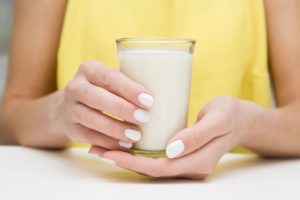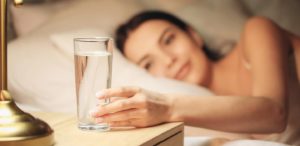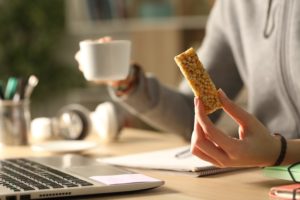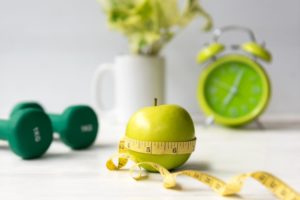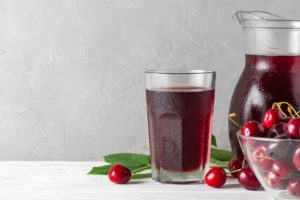When you buy through our links, we may earn a commission. Products or services may be offered by an affiliated entity. Learn more.
Here’s Why You Get Sleepy After Eating
- Feeling sleepy after eating is common and can be attributed to factors like size and timing of the meal.
- High-fat and high-carbohydrate foods have been found to increase perceived drowsiness after eating.
- Overall health and sleep patterns can also contribute to feelings of fatigue after meals.
- Eat mindfully and make nutritional choices to avoid post-meal tiredness.
If you’ve ever craved a nap following a holiday meal, fought sleep while driving home from a restaurant, or nodded off during a post-lunch meeting or class, you’ve experienced a common phenomenon called postprandial somnolence.
You might have heard that the reason people get sleepy after eating is because their bodies redirect blood from their brains to their digestive tracts—but scientific evidence has debunked this myth. Post-meal drowsiness is actually the combined result of several body processes and behaviors, and while you may not be able to avoid it completely, you can take steps to minimize it.
Is Your Troubled Sleep a Health Risk?
A variety of issues can cause problems sleeping. Answer three questions to understand if it’s a concern you should worry about.
What Is Postprandial Somnolence?
Postprandial somnolence is a scientific term used to describe feelings of sleepiness that occur after eating a meal. This phenomenon is especially common in the early afternoon, during what is known as the “post-lunch dip.” Studies have revealed a number of biological processes that contribute to drowsiness following a meal, including:
- Circadian rhythms: Circadian rhythms are natural fluctuations in body temperature, hormones, metabolism, and other physiological processes that operate according to a 24-hour clock. The circadian signals that promote wakefulness tend to decrease in the early afternoon, which can lead to sleepiness following lunch.
- Sleep drive: The longer you’ve been awake, the more your desire to sleep—known as the sleep drive—grows. Thus, you’re more likely to feel drowsy following an afternoon or evening meal than after breakfast.
- Reduced brain activity: Brain activity and cognitive function appears to slow following a meal, which may contribute to sleepiness.
- Hormonal changes: Eating promotes a drop in hormones that maintain alertness and a rise in hormones that promote sleepiness, including melatonin and serotonin.
- Cytokines: Cytokines are proteins that play an important role in the body’s immune and inflammatory responses—and they have also been linked to feelings of fatigue when the level fluctuates. The concentration of certain cytokines in your body rises after you eat, especially if you’ve consumed a high-calorie meal.
Scientists theorize that postprandial somnolence may serve several possible functions, including allowing the body to dedicate resources to digestion and helping conserve energy.
Is This Feeling Normal?
The tendency to feel sleepy after a meal, especially after lunch, is very common—though some people experience it more strongly than others and some people don’t experience it at all. People who are “night owls” or who have attention deficit hyperactivity disorder (ADHD) may be among the lucky few who are unaffected by the post-lunch dip.
While the vast majority of people experience post-meal sleepiness at least some of the time, prolonged or excessive daytime sleepiness could be a sign of another condition. For example, insomnia and sleep apnea can both lead to excessive daytime sleepiness, as can neurologic disorders, endocrine disorders, and mood disorders like depression.
Which Foods Can Make You Sleepy?
The act of eating is not solely responsible for the feelings of drowsiness that sometimes follow a meal. In fact, you may still experience the post-lunch dip even if you skip lunch. That said, research indicates that you’re more likely to feel tired after eating some foods than others.
- High-fat foods: Meals with foods that are high in fat can induce feelings of fatigue. Moreover, diets that include too much fat can compromise nighttime sleep, leading to even more daytime tiredness. Avoid foods that are high in fats, especially saturated fats such as fried foods, baked goods, pizza, potato chips, and processed meats.
- High-carbohydrate foods: A high-carbohydrate meal is more likely to cause you to feel sleepy than a low-carbohydrate meal. Avoid foods and drinks that are high in processed sugars and starches—like sweets, juices, and white bread. These may cause your blood sugar to rise quickly, increasing your risk of tiredness.
You might have heard that foods containing the amino acid tryptophan, such as turkey, cause sleepiness. Tryptophan is converted in the body to melatonin and serotonin which are both hormones that increase sleepiness. However, tryptophan alone is not to blame for the drowsiness many people feel after big holiday meals. Rather, eating a “heavy” meal with many calories from both fat and carbohydrates is a recipe for postprandial somnolence.
What Else Causes Sleepiness After Meals?
Sleepiness after eating is often the result of the timing of a meal. For example, if you eat lunch early in the afternoon, your mealtime will coincide with a natural rise in your desire to sleep and a dip in the circadian signals that support wakefulness. That said, there are several other factors that can cause or intensify sleepiness after meals.
- Disturbed sleep or sleep deprivation: If you sleep poorly at night, or if you don’t get the amount of sleep you need, post-meal drowsiness tends to be more intense due to increased sleep drive.
- High or low blood sugar: Fatigue can be a symptom of both high and low blood sugar levels. People with diabetes are more susceptible to these issues, due to difficult to regulate blood sugar levels which may be caused by taking too much or too little exogenous insulin. High and low blood sugar can also result from diet, alcohol consumption, or changes in physical activity levels.
- Iron deficiency: If you have low iron levels, you are at risk of developing restless legs syndrome (RLS), which can compromise your sleep at night and lead to excessive daytime sleepiness.
- Alcohol consumption: Alcohol can make you sleepy, and this effect is even more pronounced if you are sleep deprived.
- Chronotype: Research suggests that if you are a “lark”—that is, a morning person—you are more likely than “night owls” to experience post-lunchtime sleepiness.
How to Stop Feeling Tired After Eating
While you may not be able to completely eliminate post-meal drowsiness, there are several steps you can take to limit your chances of feeling tired after you eat.
- Make sleep a priority: Post-meal drowsiness can be significantly worse if you don’t get enough high-quality sleep, so it’s important to adopt healthy sleep hygiene practices.
- Adopt a plant-based diet: Research indicates that nutritious diets rich in vegetables, fruits, and nuts and low in saturated fats, processed foods, and desserts are associated with reduced levels of daytime sleepiness.
- Pay attention to meal size: A “lighter” meal with fewer calories will likely lead to less sleepiness than a “heavy” or high-calorie meal. In short: avoid overeating.
- Use light to your advantage: Light serves as an important circadian cue, so taking a walk in the sunshine or spending half an hour in front of a light box may help you reduce or avoid post-meal fatigue.
- Get some exercise: If your schedule allows, engage in moderate-intensity exercise, like speed walking or taking a bike ride, before post-meal tiredness sets in. This may help increase energy and stave off fatigue.
- Stay hydrated: Getting plenty of water throughout the day may improve alertness and keep sleepiness at bay.
- Drink a cup of coffee or tea: If you want to avoid sleepiness following lunch, consider sipping a caffeinated beverage. That said, to prevent nighttime sleep disturbances, make sure to avoid caffeine for at least eight hours before bedtime.
When You Should Talk to A Doctor
If post-meal sleepiness regularly disrupts your daily life, or if steps to limit it don’t work, talk to your doctor. You should also see a medical professional if you suspect your daytime sleepiness might be connected to a sleep disorder or mental health condition, or if you have unexplained symptoms, like fever or headaches.
If you experience fatigue accompanied by any of the following symptoms, seek medical attention immediately:
- Blurry vision
- Dizziness
- Swelling
- Confusion
- Inability to pass urine
- Thoughts of self-harm
References
6 Sources
-
Bazar, K. A., Yun, A. J., & Lee, P. Y. (2004). Debunking a myth: neurohormonal and vagal modulation of sleep centers, not redistribution of blood flow, may account for postprandial somnolence. Medical hypotheses, 63(5), 778–782.
https://pubmed.ncbi.nlm.nih.gov/15488646/ -
Bes, F., Jobert, M., & Schulz, H. (2009). Modeling napping, post-lunch dip, and other variations in human sleep propensity. Sleep, 32(3), 392–398.
https://pubmed.ncbi.nlm.nih.gov/19294959/ -
Yang, B., Zhang, H., Jiang, T., & Yu, S. (2023). Natural brain state change with E/I balance shifting toward inhibition is associated with vigilance impairment. iScience, 26(10), 107963.
https://pubmed.ncbi.nlm.nih.gov/37822500 -
Lehrskov, L. L., Dorph, E., Widmer, A. M., Hepprich, M., Siegenthaler, J., Timper, K., & Donath, M. Y. (2018). The role of IL-1 in postprandial fatigue. Molecular Metabolism, 12, 107–112.
https://pubmed.ncbi.nlm.nih.gov/29705519/ -
Polianovskaia, A., Jonelis, M., & Cheung, J. (2024). The impact of plant-rich diets on sleep: a mini-review. Frontiers in nutrition, 11, 1239580.
https://pubmed.ncbi.nlm.nih.gov/38379547/ -
Reyner, L. A., Wells, S. J., Mortlock, V., & Horne, J. A. (2012). ‘Post-lunch’ sleepiness during prolonged, monotonous driving – effects of meal size. Physiology & behavior, 105(4), 1088–1091.
https://pubmed.ncbi.nlm.nih.gov/22155490/



